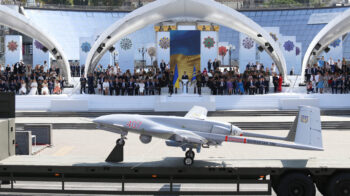
Ellen Lord, undersecretary of Defense for Aquisition Technology and Logistics
COMDEF 2019: DoD acquisition czar Ellen Lord says DoD may fund allies and industry to ensure access to rare earth minerals and reinvigorate the small drone industry to patch holes in the industrial base , both currently dominated by China
“We’re going out on the offense,” Lord told the annual ComDef conference on international defense cooperation today, “because it is necessary to have defensive measures, but it’s not sufficient to overcome what we are seeing, especially from China.” She added that it is “no secret that they will use any means necessary to gain advantage over the United States,” she said, including intellectual property theft and “blatantly stealing information.”
Lord said that US partners in the National Technology and Industrial Base (NTIB) initiative would be crucial to blocking Chinese use of trade as a weapon. She noted that the group met in September to discuss ways forward.
The 2017 NDAA’s Section 881 expanded the legal definition of the US defense industrial base to include Australia and the UK. This, in turn, allows them access to funding under Title III of the Defense Production Act, which gives the president authorities to approve financial incentives tailored to at-risk industries critical to national security and homeland defense. The Trump Administration updated the act in 2018 to broaden its scope. For DoD, Title III is managed by the Office of Industrial Policy led by Jennifer Santos.
Lord explained that DoD got the thumbs up from President Trump to spend Title III money on rare earth minerals “to bolster that supply base, and our NTIB partners are a key part of that.” Trump’s approval was issued in a series of decisions in late July, covering light rare earth elements, heavy rare earth elements, rare earth metals and alloys, neodymium iron boron (NdFeB) rare earth permanent magnets, and samarium cobalt (SmCo) rare earth permanent magnets.
David Johnston, the first-ever Defence Export Advocate for Australia made it very clear that, given market realities, if the US does not invest in his country’s rare earth mining sector then China will be the only other choice. Australia has an abundance, he said, of rare earths minerals, including lithium for computer batteries, scandium (which can be blended to make a stronger version of aluminum for shipbuilding), yttrium for lasers, titanium for aircraft, and samarium used in nuclear reactor fuel rods — the latter of which Lord mentioned as a priority for DoD’s supply chain.
“Strategic minerals in terms of our technological future are very very crucial for Australia, our friends and allies, and of course its principal ally the United States,” he said.
Johnson said that he was “very pleased” to hear the NTIB,and DoD are interested in rare earths because Australia needs investment to be able to fully support its mining sector and exploit those resources. While Canberra would like to see collaboration with “our strategic allies and friends,” there is, he warned, that “another customer who readily purchase those metals.”

DJI quadcopter for Earth Imaging, DJI image
Lord said that DoD also is looking at how to use the industrial base support fund to pump up NTIB capacity to produce small unmanned aircraft systems — “an area that has been decimated in terms of our supply base by basically dumping in the US market of very low cost drones from Chinese companies such as DJI.”
DoD’s moves are partially driven by Trump’s 2017 Executive Order demanding a strategy to reduce reliance on foreign minerals, and the July 2017 Executive Order on strengthening the US industry base and ensuring supply chain resiliency. The latter led to DoD’s Executive Order 13806 study,.
Lord noted that two other initiatives to speed acquisition of new technology also will be finalized soon. She said that DoD will be “rolling out in the next 30 days” its public/private Trusted Capital Marketplace to match “trusted capital partners” with innovative tech startups of interest to DoD. The 2018 NDAA mandated a DoD pilot program to support innovative small and medium-sized companies. The Trusted Capital program mimics what is already being done by the Air Force, via AFWERX and its industry “pitch days,” and more recently by the Army that held its first “pitch day” last month.
Furthermore, she said that year-long effort to revamp DoD’s major acquisition rules — the 5000.2 series — that tells Pentagon program managers and the defense industry how to buy everything from stealth fighters to software, guns to butter — will be finished by the end of the year. The aim of the rewrite is to simplify the process and weed out outdated paperwork requirements, Lord said.
Asked about Foreign Military Sales (FMS) to Turkey, Lord took a very tack from what we’ve heard from Capitol Hill and the White House in the last week. She cited Turkey’s long status as a “strategic partner and great ally” and that the US and Turkey “still enjoy very good military to military relations.” She further noted that “Turkey has been an excellent supplier to us over the years: very good quality, fair prices, good delivery.”
She said that DoD is in the midst of the interagency process “to determine what the Executive Order that just came out means to us.” Trump on Oct. 14 signed the order designed to dissuade Turkey from its bloody incursion into Syria against the Kurds, by imposing sanctions. That discussion, she confirmed, includes whether the US should bar all FMS sales or allow some to continue.
Turkey traditionally has been one of the world’s largest arms buyers, including one of America’s top customers. US allies, including the UK, France, the Netherlands and Norway, all have suspended future — and in some cases, already approved — arms sales to Ankara over Syria.
Lord stressed that Turkey’s expulsion from the F-35 Joint Strike Fighter program stands. “We are standing firm, as we have over the last year, that Turkey is no longer a part of the F-35 program,” she said. “And we are pulling out over 900 parts for the F-35 that are sourced in Turkey and we will have those transitioned by the end of March 2020.”
Lord made her remarks before this afternoon’s announcement by Vice President Mike Pence that Washington and Ankara had agreed to what he called a “cease fire” for 120 days while Syrian Kurds move back from the Turkish border — precisely the result Erdogan wanted to achieve using military force. It is unclear whether the Kurdish forces in Syria, US allies in the long-running civil war, had agreed. The US would, in turn, lift the sanctions imposed three days ago, Pence said. For its part, the Turkish Foreign Ministry announced that the agreement was not a “cease fire,” and that Ankara would continue its military incursion in Syria after the 120 day deadline for the Kurds to withdraw at least 20 miles away from the Turkish declared “safe zone” south of the Turkish-Syrian border.
UK pledges ‘generational’ leap in defense spending, industry to go on ‘war footing’
Under the new plan, London wants to spend a cumulative extra of £75 billion ($93 billion) over the next six years, culminating in a 2030 annual defense budget of £87 billion ($108 billion), which would make it second in NATO only to the US in defense expenditure.


























